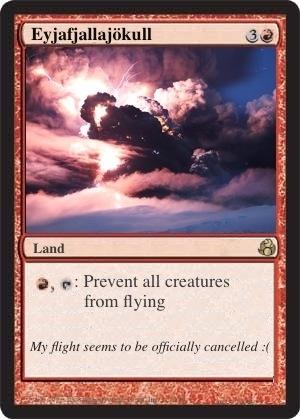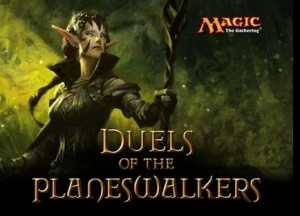Review of Magic: The Gathering — Duels of the Planeswalkers
By SealWyf, HSM team writer
I’ll admit up front that I never played the trading-card game. I was aware of it, of course — what gamer wasn’t? But my tastes ran more to the Dungeons and Dragons style of role-playing, with its character construction, world-building and interactive storytelling. I even ran a D&D group for a while, writing my own campaigns and constructing lumpy monsters from polymer clay. The trading-card games seemed like a poor imitation of real RPGs, as well as a blatant excuse to separate players from their money. Who needed them?
Fast-forward to 2010, and the PlayStation Network. Browsing through the PlayStation Store, I discovered the newly-released demo of Magic: The Gathering — Duels of the Planeswalkers. It was free, and I was bored. I downloaded it, and started fooling around.
The first thing I noticed was the interface, which was clean and elegant, and fairly intuitive. (I will confess I still try to use the d-pad keys to move the card highlight, resulting in dizzying swings of the playing field. But I’m getting used to that.) The graphics are attractive, the ambient music is exciting, and the sound-effects as creatures attack are just short of terrifying. You do not want these critters crunching you in real life.
The second thing I noticed was that the game was harder than I expected. A lot harder. And deeper, in the way that chess is deep. It’s not anywhere near as simple as it looks.
And so, within a day or two, I returned to the Store and purchased the unlock for the full version. The hook had set.
For the few readers out there who are ignorant of Magic: The Gathering game-mechanics, here are the basics. There is a magical universe, the Multiverse, inhabited largely by mages. These beings spend all their spare time fighting duels, making the game’s backstory about as deep as a series of wrestling grudge-matches. But that doesn’t matter. The mages and the backstory (such as it is) are just there to provide atmosphere.
The game itself is about logic.
There are five flavors of magic, represented by colors. Each flavor is fueled by Land cards (green by forests, red by mountains, and so on.) Having more Land cards in play allows you to use bigger and better spell cards, with which you deal damage to the opposing player’s cards, or to the opposing player. You start with a hand of seven cards, and draw one card from your Library (the deck) on each turn. On each turn, you may play one Land card, and some number of other cards. The turn is divided into two Main phases, separated by Attack, Block and Damage phases.
That’s all there is to it. Simple, really.
And chess is a simple game of moving men around a board.
 The thing is, these cards have attributes other than attack and defense strengths. They may have special abilities, such as Haste, First Strike, or Flying. Some cards augment other cards, and others diminish them. Some grant powers depending on how many Land cards you have in play. Some do really nasty things to your opponent. And that’s just for starters.
The thing is, these cards have attributes other than attack and defense strengths. They may have special abilities, such as Haste, First Strike, or Flying. Some cards augment other cards, and others diminish them. Some grant powers depending on how many Land cards you have in play. Some do really nasty things to your opponent. And that’s just for starters.After losing about twenty games to the AI at the simplest level, I started paying attention. Watching what the AI opponent does is a pretty good tutorial. You start figuring out why they attack when they do, and why they abstain. What attacks they block, and what cards they are willing to sacrifice to do it. You start copying their strategy. And, sooner or later, you will win.
Winning unlocks new cards. Or, in some cases, new decks. You find yourself saying, “Just one more game.” Until you check the clock, and realize it’s three hours past bed-time, and you can barely see the screen, and tomorrow is a work day.
It’s just that addictive.
A quick tour of the Wizards of the Coast website, Wikipedia and Google reveals that the game has all the attributes of a major media phenomenon. There are FAQ files and tutorials, multiple editions (quite a lot of them, actually), official and unofficial tournaments, expensive collectables, spin-offs, rip-offs, copyright-infringement lawsuits and outrageous parodies. There are official novelizations and a sizeable amount of fan-fic.
The Wizards site includes a search dialog that lets you find an actual, physical card game at a location near you. Or, you can play online. At this time there are game clients (created for Wizards of the Coast by Stainless Games) for the PC, the Xbox 360, and, of course, the PS3.
There is also plenty of purchaseable content. The PSN Store will happily sell you advanced cards and decks, so you have a better chance of beating your online opponents.
Which brings me back full-circle. Are trading-card games just a cold-blooded strategy for monetization? My current answer: they can be, if you let them. But they can also be an enjoyable strategy game, even without the optional foil-coated Legendaries.
Will I buy them someday? Maybe. But I figure I have several hundred hours ahead of me, just learning how to beat the AI.



The male Noslings enjoy the Magic game from time to time. Boxes and boxes of these cards. Love the artwork and the game itself does seem quite interesting… and addictive. Never did get into it and likely never will.
Your article does make one want to check it out in this media… maybe
Likewise, Nos; Seal’s the most meticulously scientific writer on the HSM team, and if she experienced a “missing time” event not dissimilar to a UFO abduction (which, really, we know the Homelings are behind anyway) from being unable to put down “Magic: the Gathering,” then perhaps it merits a peek…
Thanks, Nos and Norse. On the other hand, I may just have an addictive personality. Your mileage may vary.
As a one time avid player (and currently sometime tinkerer) of Magic, the one glaring omission I can see with the game is the lack of a deck editor.
Sure, you unlock new decks from beating AI opponents, but half the fun of the game (at least for me) is building a good deck from scratch. Hopefully, we will see that feature in future release.
With the imminent release of a Magic public space in Home, I wonder if there will be any tie-ins (or, dare i say it, unlockables) with the game. It would be nice to be able to search out players in Home and game launch right from the space.
Nice article, Seal…keep ‘em comming.